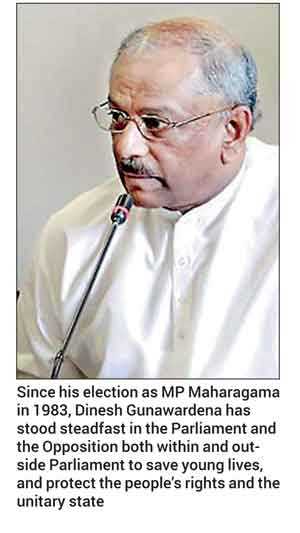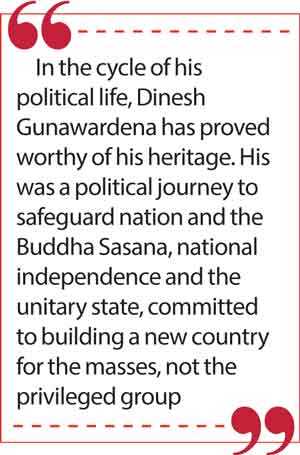Thursday Feb 19, 2026
Thursday Feb 19, 2026
Tuesday, 19 May 2020 00:00 - - {{hitsCtrl.values.hits}}
By Vinod Moonsinghe
On 18 May 1983, Sri Lanka’s last by-elections took place. Although J.R. Jayawardene had passed a new constitution in 1978, the members of Parliament still sat as members for the old constituencies. JR decided to hold elections in the 18 constituencies in which the UNP lost the referendum of December 1982.
The elections took place at a crucial time. JR’s UNP, having been returned with a four-fifths majority in 1977, had established a regime of lawlessness. Armed gangs of thugs roamed the country for weeks after the election, chasing left supporters from their homes, before turning on the minorities. This lawlessness continued, symbolised in the double promotion given to the police officer convicted of assaulting Vivienne Goonewardena, and the stoning of the justices’ homes.
The main opposition party, the SLFP, had been reduced to eight members, but JR still felt threatened, and deprived Sirimavo Bandaranaike of her civic rights. When Sarath Muttetuwagama won an election petition for Kalawana, the UNP made a mockery of parliamentary democracy by having two sitting members for the seat. Sarath was the only leftist in Parliament.
At the 1982 Presidential Election and the referendum, the UNP made a mockery of the electoral process. UNP thugs seized polling booths, stuffed ballots and intimidated and impersonated voters, including Hector Kobbekaduwa and Pieter Keuneman. This was also the case during the 18 by-elections.
Of the 18, the UNP won all but four – although the result of the Mahara by-election was fraught with doubt. Of the four seats, only one was won by a veteran politician – my father, the late Anil Moonesinghe, won Matugama for the SLFP. Two others, Baddegama and Akmeemana, were won by the SLFP’s Amarasiri Dodangoda and Richard Pathirana, respectively. Maharagama was won by Dinesh Gunawardena, of the revived MEP. They had all participated vigorously in the presidential campaign of Hector Kobbekaduwa and in the referendum, championing the cause of immediate democratic elections.
The four came from different backgrounds. My father had been a politbureau member of the LSSP, elected to Parliament in 1956 from Agalawatte, and becoming minister of transport in Sirimavo Bandaranaike’s 1964 Coalition Government. In 1977, he contested the Matugama electorate, under the aegis of the United Left Front (ULF), of the LSSP, CPSL and PDP. He split from the LSSP on the issue of supporting the SLFP candidate at the Presidential Election.
Both Dodangoda and Pathirana had backgrounds in education, although the former had become a lawyer. This was Pathirana’s first attempt at Parliament, but Dodangoda had contested the Baddegama electorate from the ULF in 1977.
At the time of the by-elections, Dinesh Gunawardena was still a young man, with no parliamentary experience. However, he had the benefit of knowing the parliamentary experiences of his father, the “father of socialism in Sri Lanka”, Philip Gunawardena, his mother, Kusuma Gunawardena, who represented the area from Avissawella to Pannipitiya, and his uncle Robert Gunawardena, former MP for Kotte (of which Maharagama was a part).
In 1977, he contested Avissawella from the MEP, which he had revived and led, campaigning on his father’s creed of indigenous socialist democracy, and non-violent change. At the beginning of the 1980s, he allied himself with Sirimavo Bandaranaike’s wing of the split SLFP.
The newly-elected MPs went into a House in which the UNP stood in monolithic control, occupying, not only the government benches, but half the opposition ones as well. As my father rose to make his first speech in the Kotte Parliament building, he was met with a wall of noise, as he was barracked by the UNP, orchestrated by the then Prime Minister, R. Premadasa.
However, the four new entrants faced the massive Government force, and made a real change. They galvanised the moribund Opposition benches, led by Anura Bandaranaike. The Hansard of the time is replete with the contributions made by them to the debates of the time. Despite the four-fifths majority, the UNP found it had a fight on its hands.
When the country was betrayed in 1987, the four MPs were on the ground, leading the spontaneous mass demonstrations. They laid the foundation for the return of the SLFP-MEP combined opposition in the 1989 general election. Without the contribution they made outside Parliament, as well as on the floor of the House, our history might have been different. We might still be living in the Dark Age inaugurated by the defeat of 1977.
Of those four parliamentary paladins, only one is still among us, Dinesh Gunawardena. Since his election as MP Maharagama in 1983, he has stood steadfast in the Parliament and the Opposition both within and outside Parliament to save young lives, and protect the people’s rights and the unitary state.
He supported Chandrika Kumaratunga in the 1999 Presidential Election, becoming a minister in 2000 in the UPFA Government, and began the process of re-establishing the CTB (now the SLTB). After a stint in Opposition, he became a minister in the PA Government of 2004, continuing in office until 2015, becoming Chief Government Whip.
When President Mahinda Rajapaksa was defeated in 2015, and all appeared to have deserted him, Dinesh led the rally to build public opinion against the Government, starting from the Nugegoda mass meeting. When the Opposition’s very seats came under threat, he united and built the Joint Opposition, leading the people’s struggle within the Parliamentary group to democratically change the political balance. In this, he reprised his role in 1983-’89. He was a bulwark in the struggle of the former President to create a non-UNP government. He has carried out his parliamentary tasks with maturity, humility and love for the country and the people, keeping the public trust. His was the tocsin to change the corrupt electoral system and to create a mixed-representation electoral system. He introduced the amendments to prevent voter impersonation, by making identity cards compulsory.
He has experience both in and out of Parliament, and a vision making him an exemplar, without greed for office. The motherland can surely not forget the speech he made in Geneva before the dissolution of Parliament.
In the cycle of his political life, he has proved worthy of his heritage. His was a political journey to safeguard nation and the Buddha Sasana, national independence and the unitary state, committed to building a new country for the masses, not the privileged group. He went forward with youth leagues, trade unions, peasant unions and the Panchamaha Balavegaya.
The experience of those six years, 1983-’89 facing the UNP mountain gave him the temper to face all challenges steadfastly. As we mourn the passing of the other three paladins of that era, let us remember the one still in our midst.